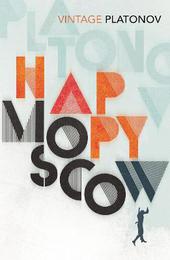
|
Happy Moscow
Paperback / softback
Main Details
| Title |
Happy Moscow
|
| Authors and Contributors |
By (author) Andrey Platonov
|
|
Translated by Elizabeth Chandler
|
|
Translated by Robert Chandler
|
| Physical Properties |
| Format:Paperback / softback | | Pages:288 | | Dimensions(mm): Height 198,Width 129 |
|
| Category/Genre | Modern and contemporary fiction (post c 1945) |
|---|
| ISBN/Barcode |
9780099577256
|
| Classifications | Dewey:891.7342 |
|---|
| Audience | |
|---|
|
Publishing Details |
| Publisher |
Vintage Publishing
|
| Imprint |
Vintage Classics
|
| Publication Date |
1 August 2013 |
| Publication Country |
United Kingdom
|
Description
An anarchic satire from one of Russia's greatest twentieth-century writers, long censored and forgotten TRANSLATED AND WITH AN INTRODUCTION BY ROBERT CHANDLER Moscow in the 1930s is a symbol of Soviet paradise; a fairy-tale capital where, in Stalin's words, 'life has become better, life has become merrier". Beautiful, passionate, Moscow Chestnova bears her captial's name, and seeks the happiness it promises. She flits from man to man, fascinated by the brave new world supposedly taking shape around her, on a quest for the better life. This anarchic satire is accompanied by related works - short stories, an essay and a screenplay - and through Robert Chandler's acclaimed new translations Platonov's extraordinary prose and original vision can at last be experienced in full.
Author Biography
Andrey Platonovich Platonov (1899-1951) was the son of a railway-worker. The eldest of eleven children, he began work at the age of thirteen, eventually becoming an engine-driver's assistant. He began publishing poems and articles in 1918, while studying engineering. Throughout much of the twenties Platonov worked as a land reclamation expert, draining swamps, digging wells and also building three small power stations. Between 1927 and 1932 he wrote his most politically controversial works, some of them first published in the Soviet Union only in the late 1980s. Other stories were published but subjected to vicious criticism. Stalin is reputed to have written "scum" in the margin of the story "For Future Use," and to have said to Fadeyev (later to be secretary of the Writers' Union), "Give him a good belting-for future use!" During the thirties Platonov made several public confessions of error but went on writing stories only marginally more acceptable to the authorities. His son was sent to the Gulag in 1938, aged fifteen; he was released three years later, only to die of the tuberculosis he had contracted there. From September 1942, after being recommended to the chief editor of Red Star by his friend Vasily Grossman, Platonov worked as a war correspondent and managed to publish several volumes of stories; after the war, however, he was again almost unable to publish. He died in 1951, of tuberculosis caught from his son. Happy Moscow, one of his finest short novels, was first published in 1991; a complete text of Soul was first published only in 1999; letters, notebook entries and unfinished stories continue to appear.
ReviewsHappy Moscow is worth reading on countless scores. On the violence, often not physical, which a totalitarian system wreaks on the lives of those who exist within it, it is a vital counterpart to those works which deal with the more tangible horrors of the USSR, and a reminder of the unique, paradoxical power of literature to expose the mismatch between rhetoric and reality * Spectator * In the Thirties Stalin proclaimed Moscow a paradise. This savage satire shows the truth through the eyes of the ebullient Moscow Chestnova. In Platonov's hands she becomes a parody of a superwoman who leaves a career in aeronautics for lovers and life. Around her is a fascinating cast of characters and, even in translation, Platonov's prose is extraordinary * The Times * I squint back on our century and I see six writers I think it will be remembered for.They are Marcel Proust, Franz Kafka, Robert Musil, William Faulkner, Andrey Platonov and Samuel Beckett...They are summits in the literary landscape of our century -- Joseph Brodsky Andrey Platonov is the most exciting Russian writer to be rediscovered since the end of the Soviet Union. Happy Moscow shows Platonov as a master of language, weaving out of official names, political speeches, ideological exhortations and popular philosophical hopes a reality equal to the gut feel of Soviet life in the 1930s... This is just what it felt like to be swept away by the Soviet ideal of a new humanity * Independent * Andrei Platonov was an eloquent and brave voice in the Soviet era... the best Russian writer of the 20th century -- Frank Westerman * Independent *
|